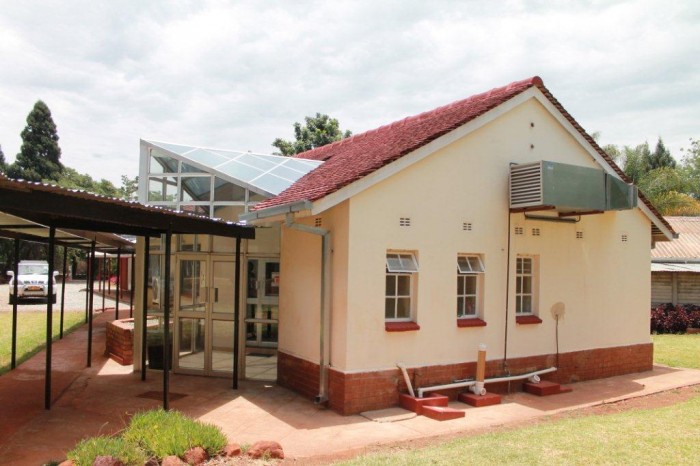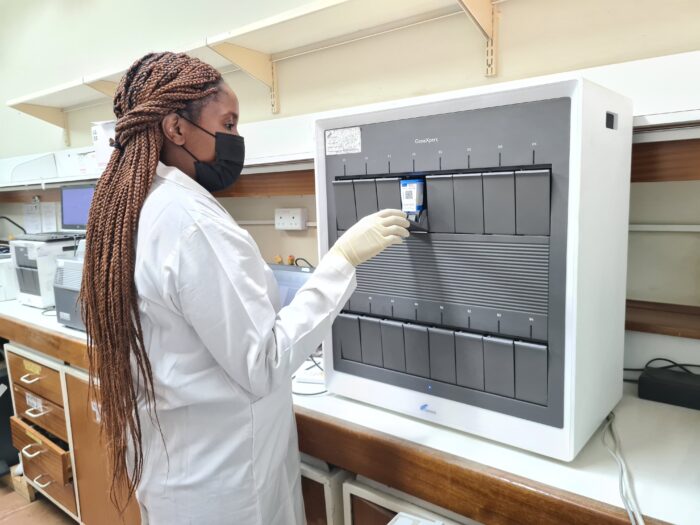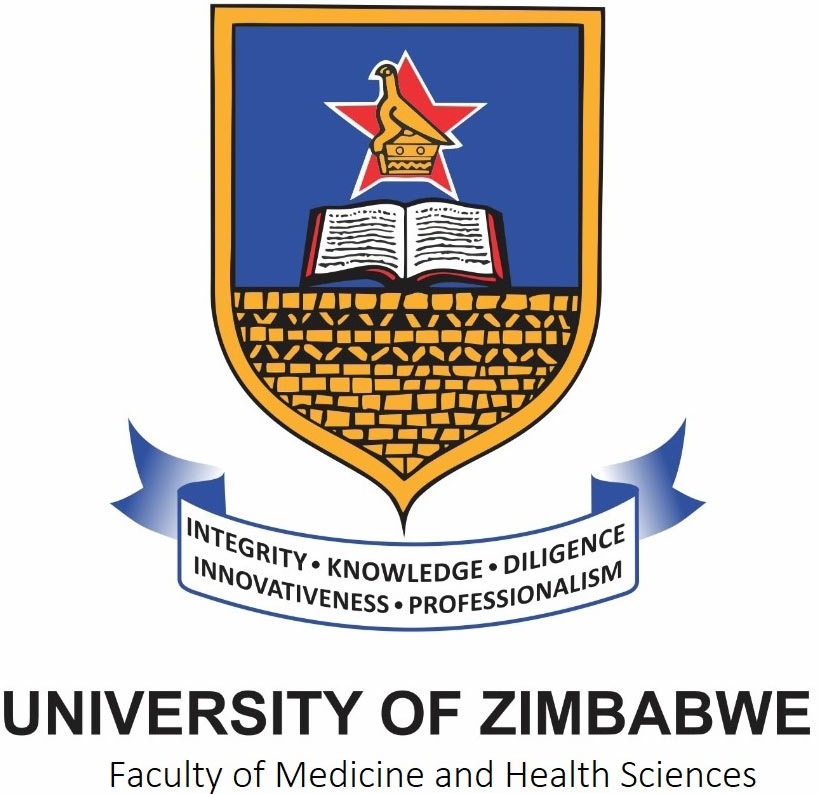
Central Laboratory Structure and Capacity
The UZ-CTRC Central Laboratory was established in 1994 and is situated at the Parirenyatwa Group of Hospitals in Harare, within the UZ Faculty of Medicine and Health Sciences (FMHS) Units of Obstetrics and Gynecology, Medicine, and Pediatrics. The Laboratory Department is comprised of one Central Laboratory at UZ FMHS, a biosafety level 3 Tuberculosis (TB) laboratory situated at Wilkins Infectious Disease Hospital, a cytology laboratory situated in the UZ FMHS Paediatrics unit and satellite laboratories co-located at each of the seven distinct geographic locations of the Clinical Research Sites (CRSs). The Central Laboratory receives a daily average of 350 samples (bloods, urine and swabs) from an estimated 120 participants from the CRSs and provides testing in Chemistry, Serology, Immunology, Molecular, Hematology and Flow Cytometry. Our specimen repository contains liquid nitrogen storage facilities capable of storing 50 000 samples, -80°C freezers which hold in excess of 700 000 samples and -20°C freezers with over 60 000 sample capacity.
The UZ-CTRC Central Laboratory is a centralized, highly sophisticated, multi-disciplinary research laboratory providing support for NIAID Division of AIDS (DAIDS) funded network protocols, and for research funded by private non-profit and for-profit partners investigating HIV and other related co-morbidities. Since inception, the laboratory has successfully supported scientific testing for over 45 protocols. The laboratory is staffed by 15 medical scientists and three technicians with experience ranging from five to 20 years.
Good Clinical Lab Practice (GCLP), Accreditation, and Test Validity
The Central Laboratory is certified by DAIDS as a full reference laboratory and is also ISO 15189 accredited. The laboratory participates in proficiency testing provided by the College of American Pathologists (CAP), Virology Quality Assurance (VQA), Thistle, INSTAND, Immunology Quality Assessment (IQA), TBGxMonitor, National Health Laboratory Services (NHLS), Microbicides Trials Network (MTN) and United Kingdom National Quality Assurance System (UKNEQAS) ,2-6 times per year. Compliance to Good Clinical Laboratory Practice (GCLP) and ISO 15189 is monitored once annually by both DAIDS-appointed auditors and Southern African Development Community Accreditation Service (SADCAS).
Specialised Testing Capacity
Tuberculosis: The UZ-CTRC BSL3 TB Laboratory, has the capacity to perform sputum smear microscopy, sputum solid and liquid culture and molecular techniques including GeneXpert MTB/RIF to diagnose and detect drug resistant TB in one test. It is also equipped to support local and international clinical trials for diagnosis and treatment of TB, new TB drug development, including pharmacokinetic studies, and to support research on multi-drug resistant (MDR) and extensively drug resistant (XDR) TB. Cytology and Histology: The cytology laboratory is equipped to support processing of more than 20 PAP smears per day as a standard of care for study participants. Additionally, specialized histology laboratory is currently equipped, with a tissue processor and wax embedding centre. Human Papillomavirus (HPV): The UZ-CTRC has the capacity to test for HPV on the Atila Biosystems & GeneXpert® machines. The former is a Real time Polymerase Chain Reaction (RT-PCR) analyser with a capacity to test 16 samples per batch and detects Low Risk HPV 6 & 11 and High-Risk HPV (16/18/31/33/35/39/45/51/52/53/56/58/59/66/68). Acceptable specimen types include samples stored in thin-Prep and Atila Sample Storage Solution, Formalin fixed Paraffin Embedded samples, Purified HPV DNA and Dry swabs. The RT-PCR Gene Xpert® systems specifically identifies HPV 16 and HPV 18/45 in two distinct channels and reports other high-risk types in a pooled result. Acceptable specimen should be collected in PreserveCyt Solution. Mucosal Immune Cells Assessments: The Central Laboratory has increased the range of Flow Cytometry test assays for quantification of immune cells and HIV- tropic cell receptors in the lower female genital tract to assess risk of HIV infection. The process involves isolation of vaginal immune cells from cervical cytobrush and quantification of surface markers by multi parameter Flow Cytometry.
Routine Testing Capacity
Chemical Pathology: Liver Function tests [Total bilirubin, Direct bilirubin, AST, ALT, ALP, GGT, Total protein, Albumin]; Renal Function Tests [Urea, Creatinine, Sodium, Potassium, Phosphate, Chloride, Calcium, Uric Acid]; Lipid Profiles [Triglycerides, Total Cholesterol, HDL Cholesterol, LDL Cholesterol]; Pancreatic Enzymes [Amylase, Lipase]; Cardiac Function Tests [Creatine kinase, LDH]; Other Tests [Serum Bicarbonate, Magnesium, and Glucose]
Molecular Diagnostics: HIV RNA PCR, HIV DNA PCR, SARS COV 2 PCR, Chlamydia Trachomatis/Neisseria Gonorrhoea & Trichomonas Vaginalis Gene Xpert
Serology: HIV Serology, Syphillis Serology, Hepatitis Serology & QuantiFERON (IGRA)
Haematology & Flow Cytometry: FBC & Differential; T cell Profile (CD3/8/45/4)
Specimen Management: Receiving and processing of blood, urine, vaginal & endocervical swabs, gram smears, hair, cervicovaginal fluid and other sample matrices for local safety testing and shipping to external labs for specialised testing where local capacity is not yet in place. Robust Laboratory Information Management Systems (LIMS) in use are the DisaLab Laboratory Information System (LIS) and the Frontier Science Laboratory Data Management System (LDMS).
PBMC: Processing and storage of viable and non-viable Peripheral Blood Mononuclear cells (PBMCs) for future analysis including cellular function assays, drug metabolism assays and pharmacogenetic studies.
Contact
For inquiries to the UZ-CTRC Central Laboratory and the services it provides, please contact Laboratory Director, Dr Allen Matubu. Email: amatubu@uz-ctrc.org



